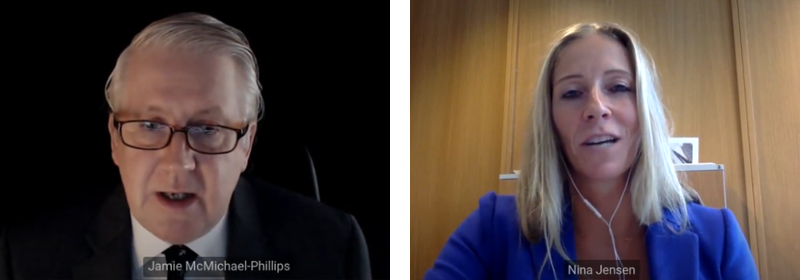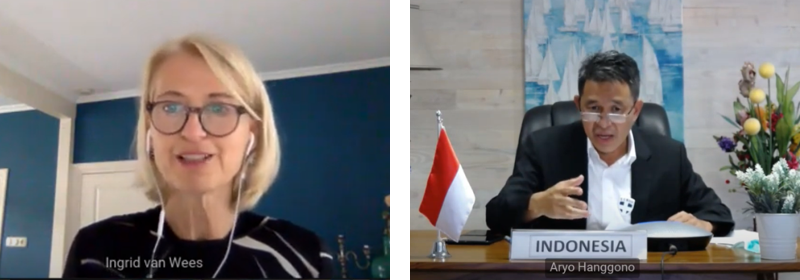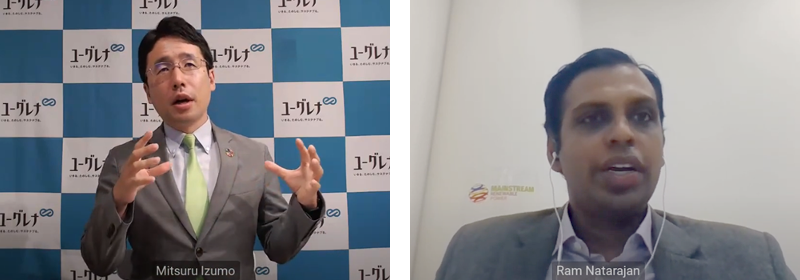News
[Event Report] The Minister of the Environment and high-level speakers discussed science, innovation and finance for a blue recovery (detailed)
On Wednesday, 26 August 2020, the 2nd webinar, “Why Science and Innovation are Crucial for a Blue Recovery” was organized as a part of the World Ocean Summit Insight Hour webinar series, jointly organized by the Ocean Policy Research Institute of The Sasakawa Peace Foundation, The Nippon Foundation, and The Economist Group. Science, technology and innovation are playing critical roles in promoting a sustainable ocean-based economy and facilitating the socio-economic recovery from the COVID-19 pandemic impacts that is called a “blue recovery”. To overcome global challenges, such as safeguarding the ocean’s health and establishing a sustainable ocean economy, requires the strengthening of science, innovation and finance. The UN Decade of Ocean Science for Sustainable Development that is to start in 2021 will provide leverage in this respect.
At this 2nd webinar, H.E. Mr. Shinjiro Koizumi, Minister of the Environment, emphasized that the Government of Japan is committed to playing a leadership role in achieving a sustainable ocean. In the panel discussions, a group of distinguished multi-stakeholder panelists from around the world, including leaders and executives from government, science and research, the private sector and international organizations discussed how to promote science, innovation and finance for achieving a sustainable ocean and promoting a blue recovery.
In his introductory remarks, Mr. Charles Goddard, Asia Pacific Editor of The Economist, opened the webinar by stating that countries, businesses and people around the world are being adversely affected by the COVID-19 pandemic and are experiencing an unprecedented economic downturn. He underlined that innovation, technology, and finance are the essential pillars for promoting a blue recovery and achieving a sustainable ocean economy. Mr. Goddard underscored that it is vital to promote a sustainable ocean economy as a way to restore the overall economy and necessary to catalyze science, innovation, and finance without degrading the ocean’s health.
In his opening remarks, Dr. Atsushi Sunami, President of The Sasakawa Peace Foundation and the Ocean Policy Research Institute of SPF, recalled the discussions at the 1st webinar held last month to commemorate Japan’s Marine Day. He stated that both President Remengesau of Palau and Chairman Sasakawa of the Nippon Foundation underlined the importance of bolstering collective action to tackle mounting threats and challenges faced by Mother Ocean. He noted that the coronavirus has inflicted unprecedented socio-economic damage on the world, and the international community has been striving to overcome COVID-19 and pursue a blue recovery. At the same time, he referred to the recent disaster that devastated the coastal area of Mauritius. He mentioned that the people of Mauritius, with the support of France, India, Japan and others, are striving to salvage their renowned marine and coastal areas that were contaminated by the oil spill, and underlined the need to mobilize support to facilitate recovery and prevent the recurrence of such disasters. He expressed his hope that the webinar would help to galvanize inspiration and strengthen partnerships for achieving a sustainable ocean and promoting a blue recovery.
In the keynote dialogue, H.E. Mr. Shinjiro Koizumi, Minister of the Environment, Japan, interacted with Mr. Goddard on the issues of a blue recovery and policies and initiatives related to the ocean. Minister Koizumi expressed his great concern over the marine pollution caused by the oil spill in Mauritius and referred to the assistance provided by the Government of Japan, such as the dispatch of oil spill recovery experts and equipment. He also underlined the steps that he has taken towards mitigating climate change, including halting support for construction of coal-fired power plants in foreign countries. He mentioned that he is convening the online ministerial meeting of the Conference of the Parties to the UN Convention on Climate Change on 3 September 2020 as an initiative to advance consensus building and international cooperation for effective implementation of the Paris Agreement. Concerning marine plastic issues, Minister Koizumi referred to the Osaka Blue Ocean Vision that aims to eliminate additional pollution by marine plastics by 2050. He mentioned that the Vision is endorsed by 86 countries and he intends to make it universal and to deliver a global solution. He also stated that the Government of Japan supports ASEAN countries by providing technology and know-how to improve solid waste management, develop action plans, and promote monitoring.

Mr. Goddard asked about the impacts of the recent legislation in Japan to start charging for plastic shopping bags from July of this year. Minister Koizumi referred to a preliminary report that 70% of shoppers declined plastic bags the first month. He also mentioned that high school students collected 90 thousand signatures to ask businesses to reduce plastic packages. He said that he strives to promote the 3Rs, i.e., to reduce, reuse and recycle plastic materials, and intends to develop a concrete policy for reducing plastics in cooperation with the Ministry of Economy, Trade and Industry.
Mr. Goddard also asked about Japan’s policies for meeting Aichi Biodiversity Target 11, which calls for conserving 10% of marine and coastal areas. In reply, Minister Koizumi referred to the legislative revision that will promote the designation of marine areas for conservation, and pointed out that the Ministry of the Environment is considering measures to designate marine areas in Ogasawara island as a priority. Concerning the post Aichi target, he noted a proposal that will increase the target from 10% to 30% and he underlined the importance of advancing discussions based on science and of preparations for the 15th meeting of the Conference of the Parties to the Convention on Biological Diversity (CBD/COP15) to be held in China.
Mr. Goddard conducted a polling question of the webinar audience, asking about their priorities for ocean science: 33.8% replied that improving data and information systems is a priority, followed by promoting ocean literacy (29.4%), integrating warning systems for ocean-related hazards (15.7%), comprehensive ocean mapping (13.7%) and ocean observation (7%).
In the High Level Panel discussions, 6 panelists from the government, businesses, an NGO and an international organization exchanged views on a blue recovery. Mr. Jamie McMichael-Phillips, Director, Seabed 2030 Project, explained that the Sea-bed 2030 project is collaborating with the Nippon Foundation on its mission to map the entire world ocean floor by 2030 and provide information useful to projects on climate change, sea level rise and tsunami impacts, essential for research with commercial, environmental, and economic implications. He mentioned that one-fifth of the world’s ocean floor was already mapped but there is a need to promote international collaboration to increase its coverage to 100% by 2030. He emphasized that seabed information is useful as baseline data and helps to advance ocean science in the context of the UN Decade of Ocean Science for Sustainable Development.
Ms. Nina Jensen, CEO, Rev Ocean, introduced the plan of Rev Ocean for building the most advanced large research and expedition vessel that will offer a free platform for scientists and ocean enthusiasts from around the world to create solutions for ocean problems. She stated that due to the COVID-19 interruption the project is unfortunately delayed, but she expressed her hope to launch the vessel in 2022 and to enhance knowledge of the ocean and make such knowledge available for decision makers and practitioners. By integrating science, innovation and technology into one initiative, she hopes to produce concrete solutions. She stated that Rev Ocean has received more than 100 research proposals and is assessing them by taking into account three major priorities, namely, eliminating plastic pollution, tackling climate change and halting overfishing. She explained that one proposal was intended to filter sea water to monitor and remove micro plastics. She said that another proposal was to promote planting and restoration of kelp forests around the world so as to absorb CO2 from the atmosphere. She referred to another proposal to use a new technology similar to face recognition that would be installed in fishing gear to avoid fishing non-targeted fish and reduce bycatch. She stated that these are just a few of numerous research proposals, and Rev Ocean hopes to select and undertake innovative research and experimentation projects. To enhance the impacts of research and experimentation work, she suggested that Rev Ocean is striving to strengthen cooperation with partners and expand its networks to know more about the ocean and support decision-making and practices conducive to achieving a sustainable ocean.

(left) Mr. Jamie McMichael-Phillips, Director, Seabed 2030 Project, (right) Ms. Nina Jensen, CEO, Rev Ocean.
Dr. Aryo Hanggono, Director General of Marine Spatial Management, Ministry of Marine Affairs and Fisheries, Indonesia, in response to Mr. Goddard’s question about Indonesia’s strategies to tackle IUU fishing, pointed out that eliminating IUU fishing is still a vital policy goal for Indonesia and mentioned that Indonesia has identified 71 illegal fishing vessels during the COVID-19 pandemic. The fishery sector turned vulnerable during the COVID-19 pandemic, as IUU fishing cases have grown by 5-fold. He suggested that Indonesia needs innovative investigation methods and satellite technology to curb IUU fishing during the pandemic. All measures have been undertaken to investigate IUU fishing cases, as investigators conduct temperature checks of those apprehended, use audio for communication, segregated transportation, and 14-day quarantines, and finalize documents for prosecutors. The coast guards have updated data on IUU fishing vessels for effective patrolling. He claimed that it is vital to have updated data, and investigators require training and capacity development. He also stated that climate change adaptation is also a priority policy and that he intends to strengthen data collection activities and restore and conserve mangrove coral reef areas.

Mr. Ram Natarajan, Chief Executive, APAC (Asia-Pacific), Mainstream Renewable Power, underlined that there is a growing demand for energy, and wind power generation offers a useful source of renewable energies. He stated that Viet Nam has a strong commitment for decarbonisation and is endowed with the potential of 20GW of renewable energy. He referred to the complicated challenges of coordinating 15 ministries involved in wind power generation. He also considers it indispensable to involve community stakeholders. He suggested that it is key to capitalize upon the government’s commitment to shift energy policy towards de-carbonization and to create good practices. Mainstream Renewable Power intends to apply its 15 years of experience in Europe to Asia and the Pacific. He stated that it is essential to locally customize projects, taking into account local topographical and socio-economic conditions. He also underpinned the importance of promoting coastal land and marine area use planning by promoting coastal land and seascape planning and coordinating stakeholders’ interests, such as those of fishing communities. He underlined that science needs to be reliable and open. He also claims that mapping and modelling are key. He also expressed his hope for floating wind farms and pointed out a need to engage the private sector in the long term.

(left) Mr. Mitsuru Izumo, Chief Executive, Euglena Co., (right) Mr. Ram Natarajan, Chief Executive, APAC (Asia-Pacific), Mainstream Renewable Power.
Throughout the discussion, it was obvious that the speakers attach importance to stakeholder and private sector engagement; the integration of science, technology, innovation and finance; and awareness raising, communication, and capacity development in order to promote a blue recovery and achieve a sustainable ocean.